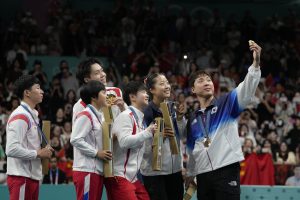Most Olympians from around the world knew that when the games were over, they would return home to warm support, celebrations, and perhaps even victory parades. But the North Korean athletes faced a starkly different reality.
Returning North Korean athletes have reportedly been subjected to “ideological evaluation” and face potential punishment for any actions at the Games met with disapproval from the government at home.
North Korea observers have expressed special concern this year because two North Korean table tennis players, Kim Kum Yong and Ri Jong Sik, received international attention for appearing in an innocuous “victory selfie” with their South Korean and Chinese counterparts. The International Olympic Committee (IOC) has so far not publicly responded to media reports regarding what these athletes may be facing in North Korea.
Sport has long held great significance for Pyongyang, not only as a source of international pride, but also because sporting events provide a rare opportunity for sports diplomacy. For the most isolated country in the world, sport is one of the few vehicles through which North Korea actually comes into contact with the international community.
Five former government officials and two men who worked overseas told Human Rights Watch after escaping North Korea that anyone allowed to go abroad, including athletes, undergoes rigorous ideological training, constant monitoring on performance and personal interactions while abroad, and exhaustive evaluations upon return. Even minor deviations from approved conduct are scrutinized, and any signs of outside ideological influence can result in severe unspecified consequences.
The IOC should be aware of this history and should consider it part of its job to offer North Korean athletes support.
This treatment is part of a broader pattern of repression in North Korea that has intensified since the COVID-19 pandemic and expanded upon an almost eight-decade-long crackdown on freedom of expression, opinion, thought, and access to information. Since 2020, the government has ramped-up ideological campaigns to limit any form of influence from the outside world and mandated tough punishments for anyone caught exhibiting traits deemed to be South Korean style. Last year, for instance, 20 North Korean youth athletes were reportedly sentenced to three to five years of hard labor in prison for using South Korean slang while at a winter training camp.
The IOC should leverage its relationship with North Korea to advocate respectful and dignified treatment of North Korean athletes and publicly demand they be protected from harassment or abuse. An immediate investigation into the safety of the table tennis players, as well as the 14 other North Korean athletes who competed at the Games, is crucial.
Over the years, the IOC’s response to repressive actions by member states has been inconsistent. Unlike Taliban-led Afghanistan in the 1990s or apartheid South Africa, North Korea has never been banned from Olympic Games participation because of human rights concerns. Their only ban came in 2022, due to a COVID-19-related withdrawal. Far from ever criticizing North Korea, the IOC under outgoing President Thomas Bach has actively sought engagement with the Kim Jong Un government, including by providing funds through the Olympic Solidarity fund.
The IOC should ensure that any engagement with North Korea is principled and contingent on human rights commitments. It should not ignore abuses of athletes that occur as a direct result of participation in the Olympics.
The IOC’s Strategic Framework on Human Rights and Safeguarding Toolkit, released in 2022 and 2017 respectively, are important steps to protect athletes’ human rights. The toolkit supports national Olympic committees and international federations to set up abuse reporting mechanisms for athletes. However, these tools are not adequate to address repression in North Korea’s system. The government’s strict limitations on access to the internet, and freedom of thought, expression, and movement, mean many of these tools are not adequate to protect the North Korean athletes from abuse at home.
To keep the integrity of the Olympic Movement and uphold the values enshrined in the Olympic Charter, the IOC needs to do everything possible so that athletes are not only celebrated at the Games but also protected from retribution when they return home.

































